四种基本时态
四种基本时态总结
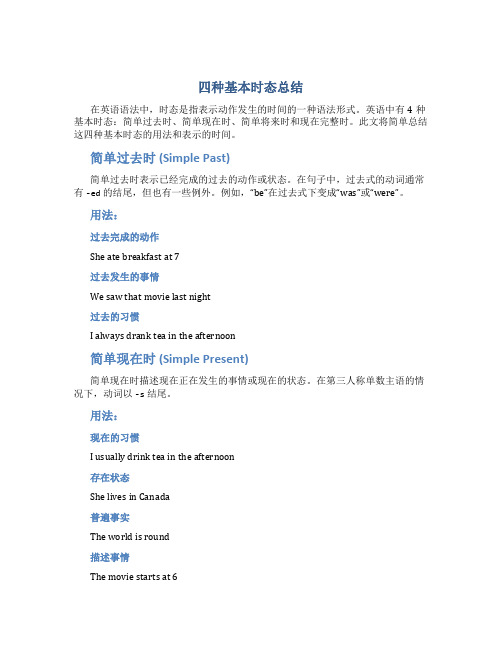
四种基本时态总结在英语语法中,时态是指表示动作发生的时间的一种语法形式。
英语中有4种基本时态:简单过去时、简单现在时、简单将来时和现在完整时。
此文将简单总结这四种基本时态的用法和表示的时间。
简单过去时 (Simple Past)简单过去时表示已经完成的过去的动作或状态。
在句子中,过去式的动词通常有-ed的结尾,但也有一些例外。
例如,“be”在过去式下变成“was”或“were”。
用法:过去完成的动作She ate breakfast at 7过去发生的事情We saw that movie last night过去的习惯I always drank tea in the afternoon简单现在时 (Simple Present)简单现在时描述现在正在发生的事情或现在的状态。
在第三人称单数主语的情况下,动词以-s结尾。
用法:现在的习惯I usually drink tea in the afternoon存在状态She lives in Canada普遍事实The world is round描述事情The movie starts at 6简单将来时 (Simple Future)简单将来时用于表示将来某个时间会发生的事情。
可以使用情态助动词will 和shall加上动词原形,也可以使用动词原形来表示未来。
用法:趋势I think gasoline prices will go up.决定或意愿I’ll help you with that homework after dinner在特定的时间或时间段内发生I’ll finish my homework by 9 PM现在完成时 (Present Perfect)现在完成时通常用于强调过去发生的事情与现在的联系。
它与简单过去时明显不同,因为它包括从过去开始,延续到现在或在过去一点时间内的动作或状态。
在句子中,现在完成时通常使用have或has和动词的过去分词。
英语四种时态

小学英语四种时态1一般现在时:是指经常发生的事情、动作或存在的状态.句型结构:主语+动词原形+其他需要注意的问题是:主语是第三人称单数时,动词要变化.末尾要加s或es.例句: I often do my homework in the evening.(肯定句)I don’t often do my homework in the evening.(否定句)Do you often do your homework in the evening?(一般疑问句)肯定回答:Yes, I do. 否定回答:No, I don’t. He gets up at 6 o’clock.当主语是第三人称单数时,否定句和疑问句中的do要变成does, 动词要变成原形.表示存在的状态: 例句: I’m tall. He is short. It’s sunny today.2一般将来时:表示将要发生的事情或打算做的事情.句型结构: 主语+ be going to + 动词原形+ 其他.例句: I’m going to go to the park tomorrow.另一种结构: 主语+will 动词原形+ 其他. 例句: Daming will play football.注意:一般将来时的否定句,要在be和will后面加not. 一般疑问句,只要把be和will放在句首就行. 3现在进行时:表示正在发生的动作或正在做的事情.句型结构: 主语+ be + 动词ing + 其他例句: I’m reading a book.He is swimming in the sea.否定句:在be后面加not. 一般疑问句:把be和主语换位置.4一般过去时:表示过去发生的事情、动作和过去存在的状态.需要注意的问题是:把动词变成过去式.句型结构: 主语+ 动词的过去式+其他例句: I went to Beijing last year. She helped her mother yesterday.否定句,在主语后面加didn’t. 动词变成原形. 一般疑问句,句子前面要加Did.动词也变成原形.表示过去存在的状态:They were young then. It was sunny yesterday.。
英语四大时态结构_含例句
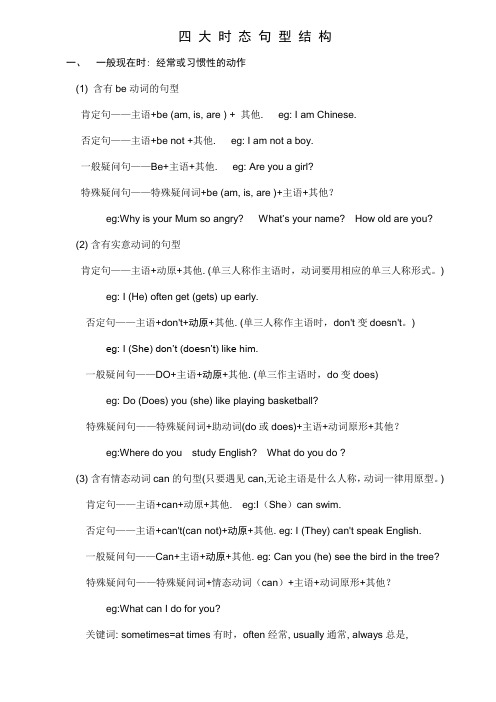
四大时态句型结构一、一般现在时: 经常或习惯性的动作(1) 含有be动词的句型肯定句——主语+be (am, is, are ) + 其他. eg: I am Chinese.否定句——主语+be not +其他. eg: I am not a boy.一般疑问句——Be+主语+其他. eg: Are you a girl?特殊疑问句——特殊疑问词+be (am, is, are )+主语+其他?eg:Why is your Mum so angry? What’s your name? How old are you? (2) 含有实意动词的句型肯定句——主语+动原+其他. (单三人称作主语时,动词要用相应的单三人称形式。
) eg: I (He) often get (gets) up early.否定句——主语+don't+动原+其他. (单三人称作主语时,don't变doesn't。
) eg: I (She) don’t (doesn’t) like him.一般疑问句——DO+主语+动原+其他. (单三作主语时,do变does)eg: Do (Does) you (she) like playing basketball?特殊疑问句——特殊疑问词+助动词(do或does)+主语+动词原形+其他?eg:Where do you study English? What do you do ?(3) 含有情态动词can的句型(只要遇见can,无论主语是什么人称,动词一律用原型。
)肯定句——主语+can+动原+其他. eg:I(She)can swim.否定句——主语+can't(can not)+动原+其他. eg: I (They) can't speak English.一般疑问句——Can+主语+动原+其他. eg: Can you (he) see the bird in the tree?特殊疑问句——特殊疑问词+情态动词(can)+主语+动词原形+其他?eg:What can I do for you?关键词: sometimes=at times有时,often经常, usually通常, always总是,every day每天, on Sunday afternoon在周日下午, five days a week一周五天, three times a month一个月三次…二、现在进行时: 正在发生的动作或存在的状态肯定句——主语+be+动词的现在分词(ing)+其他. eg: I am reading now.否定句——主语+be not+动词的现在分词(ing)+其他. eg: I am not working.一般疑问句——Be +主语+动词的现在分词(ing)+其他? eg: Are you sleeping?特殊疑问句——特殊疑问词+ be +主语+动词的现在分词(ing)+其他?eg:What are you doing?关键词:now现在, at the moment此刻, look, listen, keep quiet等提示语.三、一般将来时: 将要发生的动作(1)含有will的句型肯定句——主语+will+动词原型+其他. eg: I will call you later.否定句——主语+will not +动词原型+其他. eg: I will not go to the park.一般疑问句——Will +主语+动词原型+其他. Will you go shopping with her?特殊疑问句——特殊疑问词+will +主语+动词原形+其它?(will 可改为be going to ,疑问句中当主语是第一人称时will改为shall)(2)含有be going to 的句型肯定句——主语+be(am / is / are) + going to +动词原形+其它.否定句——主语+be(am / is / are)+not + going to +动词原形+其它.一般疑问句——Be(am / is / are) +主语+ going to +动词原形+其它?特殊疑问句——特殊疑问词+ be(am / is / are) +主语+ going to +动词原形+其它?关键词:tomorrow, next year明年, tonight今晚, this year今年, at the end of this term这学期期末, from now on从现在开始, soon一会儿马上, later后稍后,in three days三天之内, in the future未来…四、一般过去时: 过去发生的动作强调时间(1)含有be动词的句型肯定句——主语+be(was,were)+其他. eg: I was born on July.1st, 2000.否定句——主语+be(was,were) not+其他. eg: I was not born in 1999.一般疑问句—Be(was,were)+主语+其他? eg: Were you born in January?特殊疑问句—特殊疑问词+ be(was,were)+主语+其他. eg: When was he born?(2)含有实意动词过去式的句型肯定句——主语+动词的过去式+其他. eg: Lily went shopping yesterday.否定句——主语+did not+动原+其他. eg: He did not go to school today.一般疑问句——Did+主语+动原+其他? eg:Did she pass the test?特殊疑问句—特殊疑问词+did+主语+动原+其他. eg:Where did you go yesterday?关键词:yesterday昨天,last week上周, last year去年, 一段时间+ago如ten years ago十年前five hours ago五小时前, in +年/月,on+具体日期...Just now=a moment ago刚才,in the old days从前, long ago很久以前...。
英语四种时态+常见短语
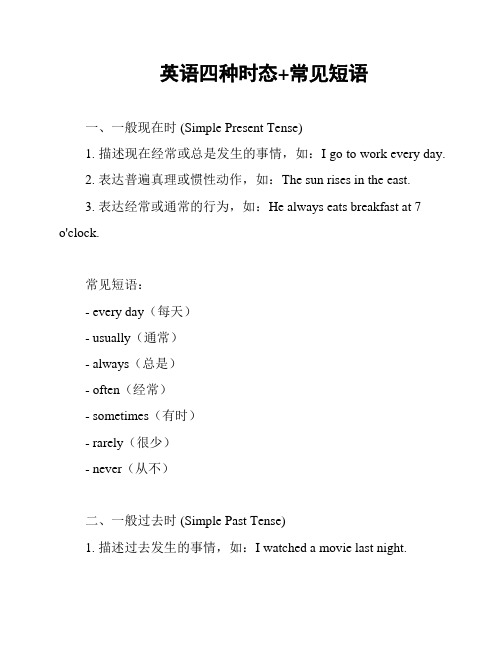
英语四种时态+常见短语一、一般现在时 (Simple Present Tense)1. 描述现在经常或总是发生的事情,如:I go to work every day.2. 表达普遍真理或惯性动作,如:The sun rises in the east.3. 表达经常或通常的行为,如:He always eats breakfast at 7o'clock.常见短语:- every day(每天)- usually(通常)- always(总是)- often(经常)- sometimes(有时)- rarely(很少)- never(从不)二、一般过去时 (Simple Past Tense)1. 描述过去发生的事情,如:I watched a movie last night.2. 表达过去常常发生的动作,如:He often went fishing when he was young.3. 表达过去的惯,如:We lived in that house for many years.常见短语:- yesterday(昨天)- last night(昨晚)- a week ago(一周前)- in the past(在过去)- when I was young(在我年轻的时候)- for many years(多年来)- in those days(在那些日子里)三、一般将来时 (Simple Future Tense)1. 表达将来会发生的事情,如:I will visit my grandparents next week.2. 表示打算或计划做的事情,如:We are going to have a party on Saturday.3. 表达预测的事件,如:I think he will win the game.常见短语:- next week(下周)- in the future(在未来)- tomorrow(明天)- on Saturday(在星期六)- be going to(打算)- will(将)- I think(我认为)四、现在进行时 (Present Continuous Tense)1. 描述现在正在发生的事情,如:She is studying in the library right now.2. 表达将来安排好的事情,如:We are leaving for a vacation next month.3. 表示暂时的情况,如:He is living with his sister while his house is being renovated.常见短语:- right now(现在)- at the moment(此刻)- in the near future(不久的将来)- next month(下个月)- while(在...期间)- currently(目前)- at present(现在)以上是英语中四种常见的时态以及常见的短语,掌握这些时态和短语可以帮助你更准确地表达过去、现在和将来的事件和状态。
四种基本时态
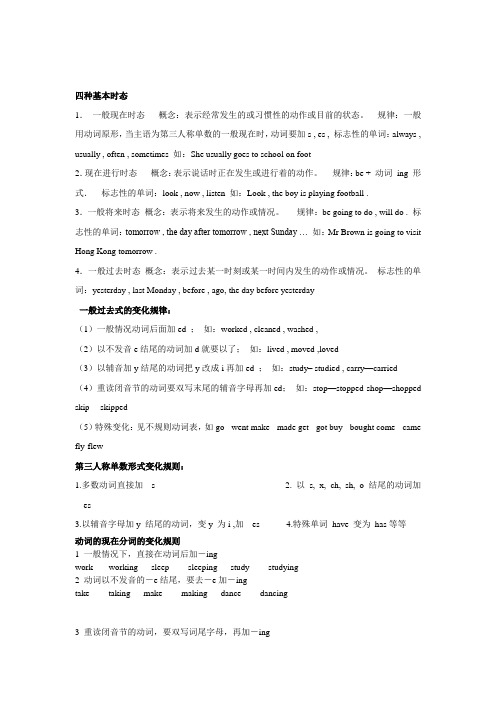
四种基本时态1.一般现在时态概念:表示经常发生的或习惯性的动作或目前的状态。
规律:一般用动词原形,当主语为第三人称单数的一般现在时,动词要加s , es , 标志性的单词:always , usually , often , sometimes 如:She usually goes to school on foot2.现在进行时态概念:表示说话时正在发生或进行着的动作。
规律:be + 动词ing 形式.标志性的单词:look , now , listen 如:Look , the boy is playing football .3.一般将来时态概念:表示将来发生的动作或情况。
规律:be going to do , will do . 标志性的单词:tomorrow , the day after tomorrow , next Sunday … 如:Mr Brown is going to visit Hong Kong tomorrow .4.一般过去时态概念:表示过去某一时刻或某一时间内发生的动作或情况。
标志性的单词:yesterday , last Monday , before , ago, the day before yesterday一般过去式的变化规律:(1)一般情况动词后面加ed ;如:worked , cleaned , washed ,(2)以不发音e结尾的动词加d就要以了;如:lived , moved ,loved(3)以辅音加y结尾的动词把y改成i再加ed ;如:study– studied , carry—carried (4)重读闭音节的动词要双写末尾的辅音字母再加ed;如:stop—stopped shop—shopped skip--- skipped(5)特殊变化:见不规则动词表,如go - went make - made get - got buy - bought come - came fly-flew第三人称单数形式变化规则:1.多数动词直接加---s2. 以s, x, ch, sh, o 结尾的动词加---es3.以辅音字母加y 结尾的动词,变y 为i ,加---es4.特殊单词have 变为has等等动词的现在分词的变化规则1 一般情况下,直接在动词后加-ingwork ---- working sleep ----- sleeping study ----- studying2 动词以不发音的-e结尾,要去-e加-ingtake ----- taking make ----- making dance ----- dancing3 重读闭音节的动词,要双写词尾字母,再加-ingcut ----- cutting put ----- putting begin ------ beginning4 以-ie结尾的动词,把变成y再加-inglie ----- lying tie ----- tying die ----- dying可数名词的复数变化规则:1.一般情况加s :book-- books mouth---mouths house---houses girl---girls2.以s 、sh 、ch 、x结尾的加es :class--- classes box----boxes match----matches3.辅音字母+ y结尾的变y为i加es:city---cities country----countries party----parties factory----factories4.以o 结尾的词+es的只有以下词:heroes Negroes tomatoes potatoeszeroes/zeros以o 结尾并且词尾有两个元音字母+s :radios, zoos, bamboos ,(pianos ,kilos photos) 5.以f,fe 结尾的变f或fe为v +es : thief wife life knife wolf half leaf shelf。
四种基本时态的语法规则

四种基本时态的语法规则英语中有四种基本时态:一般现在时、一般过去时、一般将来时和现在进行时。
每种时态都有其特定的使用规则和语法结构。
一般现在时- 用途:用于描述经常发生的动作、事实、真理、常规行为或一直存在的状态。
用途:用于描述经常发生的动作、事实、真理、常规行为或一直存在的状态。
- 动词形式:一般现在时的动词形式多是原形。
动词形式:一般现在时的动词形式多是原形。
- 一般结构:主语 + 动词原形 + 其他成分(例如时间状语、频率副词等)。
一般结构:主语 + 动词原形 + 其他成分(例如时间状语、频率副词等)。
- 例句:She sings beautifully.(她唱得很美)例句:She sings beautifully.(她唱得很美)一般过去时- 用途:用于描述已经发生的过去动作或状态。
用途:用于描述已经发生的过去动作或状态。
- 动词形式:一般过去时的动词形式通常以-ed或-d结尾,或者根据特定规则进行变化。
动词形式:一般过去时的动词形式通常以-ed或-d结尾,或者根据特定规则进行变化。
- 一般结构:主语 + 动词过去式 + 其他成分。
一般结构:主语+ 动词过去式 + 其他成分。
- 例句:He ate dinner at the restaurant last night.(昨晚他在餐厅吃了晚饭)例句:He ate dinner at the restaurant last night.(昨晚他在餐厅吃了晚饭)一般将来时- 用途:用于描述将来发生的动作或状态。
用途:用于描述将来发生的动作或状态。
- 动词形式:一般将来时的动词形式使用助动词will或be going to加上动词原形。
动词形式:一般将来时的动词形式使用助动词will或be going to加上动词原形。
- 一般结构:主语 + will/be going to + 动词原形 + 其他成分。
一般结构:主语 + will/be going to + 动词原形 + 其他成分。
四种英语时态
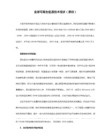
Ⅱ过去时态:四种
5.一般过去时态:表示过去存在的状态(be动词),经常做的动作
I did it. 我(过去经常)做这件事。
6.过去进行时态:表示过去正在进行的动作
I was doing it. 我(过去的某个时间)正在做这件事。
7.过去完成时态:表示过去已经完成,对过去的某个时间产生影响,形成结果
16.过去将来完成进行时态:表示对过去的某一时间来讲的将来一直在进行的动作(字面意思已经在进行),对现在来讲已成过去
I would have been doing it.
英语的基本时态由四种“时”(时间),四种“态”(状态)交叉构成。
四种“时”:过去 现在 将来 过去将来
四种“态”:常态 进行态 完成态 完成进行态
Ⅰ现在时态:四种
1.一般现在时态:表示现存的状态(be动词),经常做的动作
I do it. 我(经常)做这件事。
2.现在进行时态:表示正在进行的动作
I will do it. 我将要做这件事。
10.将来进行时态:表示将来正在进行的动作
I will be doing it. 我将要正在做这件事。
11.将来完成时态:表示到将来的某个时间已经完成,对那个时间产生影响,形成结果
I will have done it. 我(到将来的某个时间)已经做完这件事了。
I would do it.
14.ቤተ መጻሕፍቲ ባይዱ去将来进行时态:表示对过去的某一时间来讲的将来正在进行的动作,对现在来讲已成过去
I would be doing it.
15.过去将来完成时态:表示对过去的某一时间来讲的到将来的某个时间已经完成,对那个时间产生影响,形成结果,对现在来讲已成过去
四种基本时态
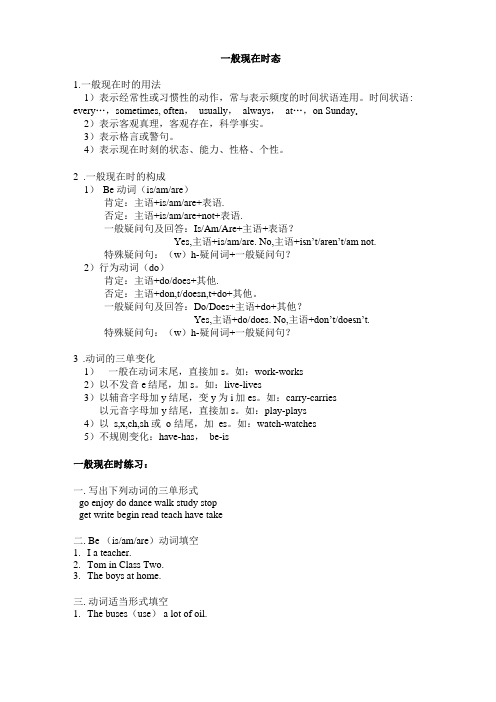
一般现在时态1.一般现在时的用法1)表示经常性或习惯性的动作,常与表示频度的时间状语连用。
时间状语: every…,sometimes, often,usually,always,at…,on Sunday o2)表示客观真理,客观存在,科学事实。
3)表示格言或警句。
4)表示现在时刻的状态、能力、性格、个性。
2.一般现在时的构成1)Be 动词(is/am/are)肯定:主语+is/am/are+表语.否定:主语+is/am/are+not+表语.一般疑问句及回答:Is/Am/Are+主语+表语?Yes,主语+is/am/are. No,主语+isn’t/aren’t/am not.特殊疑问句:(w)h-疑问词+一般疑问句?2)行为动词(do)肯定:主语+do/does+其他.否定:主语+don,t/doesn,t+do+其他。
一般疑问句及回答:Do/Does+主语+do+其他?Yes,主语+do/does. No,主语+don’t/doesn’t.特殊疑问句:(w)h-疑问词+一般疑问句?3.动词的三单变化1)一般在动词末尾,直接加s。
如:work-works2)以不发音e结尾,加s。
如:live-lives3)以辅音字母加y结尾,变y为i加es。
如:carry-carries以元音字母加y结尾,直接加s。
如:play-plays4)以s,x,ch,sh 或o 结尾,加es。
如:watch-watches5)不规则变化:have-has,be-is一般现在时练习:一.写出下列动词的三单形式go enjoy do dance walk study stopget write begin read teach have take二.Be (is/am/are)动词填空1.I a teacher.2.Tom in Class Two.3.The boys at home.三.动词适当形式填空1.The buses(use) a lot of oil.2.Each of us(have) strong points and weak points.3.My daughter(watch) TV every day. Sometimes she(see) a film on Sunday.4.Li Wei(have) a daughter. She(stay) in a nursery.(托儿所)5.Her mother(teach) English at a middle school.6.Jack often(listen) to the radio?7.They(play) football on Sundays.8.Daming often(go) to school on foot.9.We(not go) to school on Saturdays and Sundays.10.Tony(not have) piano lessons every day.四.句型转换1.They do morning exercises every day.否定句:一般疑问句:划线提问:2.Lucy does her homework in the evening.否定句:一般疑问句:划线提问:3.Her name is Li Mei.否定句:一般疑问句:划线提问:4.She has lunch at home every day.否定句:一般疑问句:划线提问:5.We have a meeting once a week.否定句:一般疑问句:划线提问:五.单项选择1.The Browns a nice car and Brown,s brother a nice jeepA. have/haveB. has/hasC. have/hasD. has/ have2.If their house not like ours, what it look like?A. is/isB. is/doesC. does/doesD. does/is3.--you think he will come? — If it tomorrow, he won,t come.A. Do/rainsB. Are/rainsC. Do/will rainD. Are/ will rain4.The little child not even know that the moon around the earth.A. do/moveB. do/movesC. does/movesD. did/moved一般过去时态1.一般过去时的用法1)表示在确定的过去时间里所发生的动作或存在的状态。
- 1、下载文档前请自行甄别文档内容的完整性,平台不提供额外的编辑、内容补充、找答案等附加服务。
- 2、"仅部分预览"的文档,不可在线预览部分如存在完整性等问题,可反馈申请退款(可完整预览的文档不适用该条件!)。
- 3、如文档侵犯您的权益,请联系客服反馈,我们会尽快为您处理(人工客服工作时间:9:00-18:30)。
A: What are you going to give your wife for her birthday?
last year
B: I can't give her a necklace. I gave her a necklace last year.
A: How about flowers?
perfume a necklace a bracelet lipstick
a wallet a watch a jacket
Small gifts are very popular.
Giving a gift to someone is happy, but when the person is very important to us ,picking a gift can be really difficult .
I gave a painting to them for their anniversary .
What are you going to give your best friend for her birthday?
I am going to give her a necklace for her birthday.
He is going to make pancakes tomorrow. As you can see,He really likes to make pancakes.
J
When is your birthday?
August
. My birthday is April 15th
F
S
M M
O
Free talk What can be given as a gift? What cannot? Why?
×
√
A gift can be something small but handmade.
• It is impolite to give something personal .
What did your parents give you for your birthday?
A: What are you going to give (him/her) ? B: I don't know. I really have to think about it.
TWheyhgaatv'se tmheeambiocysctleinfotremreysbtiirnthgdagyi.ft you They gave a bihcyacvleetoremceefiovremdy?birthday.
give sb. sth.=____ sth. __ sb.
What did you give your parents for their anniversary? I gave them a painting for their anniversary.
?
Make others happy
Follow a tradition
GIFT GIVING
As for Chinese , we often pay attention to the gift of use value but not the special meaning. So, Chinese usually give something expensive as a gift.
B: No. I can't give her flowers. I
gave her lowers two years ago.
A: What are you going to give her? B: I don't know. I really have to think about it.
two years ago
What does he like to do on the weekend? He likes to make pancakes.
He makes pancakes every day . He made the pancakes yesterday. He is making pancakes now.
J A
N
J
December
What do you usuallydo on your birthday?
have a big meal
I usually...
give or receive gift
Gift giving
What’s the meaning of giving a gift?
To show your love and care
I am going to give a necklace to her for her birthday.
Can you give me some advice?
I can't give her ... I gave her ... last month.
How about ... ? That's a good idea.
A: What are you going to give your mother for her birthday ? B: I don't know. I can't ‗‗‗‗‗‗‗‗‗‗ . I ‗‗‗‗‗‗‗‗‗‗ last year . A: How about ‗‗‗‗‗‗‗‗‗‗ ? B: No. I can't ‗‗‗‗‗‗‗‗‗‗ . I ‗‗‗‗‗‗‗‗‗‗ two years ago.
Unit 2
What do you like to do on the weekend? I like to play computer games.
I play computer games every day . I played the computer games yesterday I am not playing computer games now. I am going to play computer games tomorrow. As you can see,I really like to play computer games
